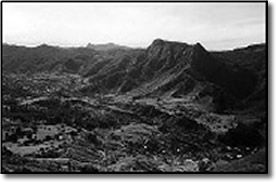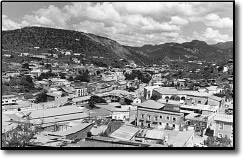| Locals head to Tres Durangos summit in
Mexico
by Jennifer Reeder
 |
Durango, Mexico, seen in these
photos, is similar
to Durango, Colo., in that it is situated in a valley
at about the same elevation and is surrounded by
mountains. However,the colonial architecture and
larger size of the Mexican counterpart give the
two cities different appearances. |
 |
Durangos from all corners of the globe will
be sharing the table this week for the Tres Durangos conference.
Eleven local residents will represent Durango, Colo., at an
international meeting with delegates from Durango, Mexico, and
Durango, Spain this Saturday. The meeting takes place in Durango,
Mexico.
Mayor John Gamble, who will be part of the local entourage,
said it is an important opportunity to participate in the developing
“global community.”
“We Americans may be a bit insular – we live in
a rich country – but I hope we can practice more and more
the shaking of hands and find ways to not be warlike to each
other,” Gamble said.
Representatives from the three Durangos began meeting in the
1980s, but the tradition stalled in 1993 during the peso crisis
in Mexico, when that Durango was scheduled to host but had to
cancel. When delegates from Durango, Mexico, visited here last
May, they decided to resurrect the meetings.
The other Durango representatives include Gamble’s wife,
Suzanne; City Councilor Joe Colgan and his wife, Mary; Mayor
Pro Tem Virginia Castro; City Councilor Aaron Tuscon; Carl Craig,
director of general services for the city and his wife, Teri;
Dr. Greg Stilwell; Companeros Coordinator Olivia Lopez; and
Mary Hart, DACRA’s tourism director. The city is sponsoring
six of the 11 attendees and one dinner during the weeklong visit.
Gamble and the group will present the mayors of the other Durangos
with sand paintings commissioned from the Toh-Atin Gallery that
incorporate the logo of the three Durangos.
One of the goals of the trip for Gamble is to lay the groundwork
for establishing student exchange programs. Gamble and his family
have hosted Bosnian high school students in the past, so the
concept is close to his heart.
“I’m looking forward to a great adventure, meeting
wonderful people, and if things go as well as I hope, hearing
that we’ve established some student exchange at the secondary
and college levels,” Gamble said.
Gamble said that though some of the other Colorado representatives
speak Spanish, the official translator of the group will be
Lopez.
“We needed the confidence of knowing that the words translated
were the words spoken,” he said. “While there’s
some Spanish-language capability on the council, I, as the mayor,
don’t have much.”
Lopez said she is honored to have been chosen for the responsibility,
particularly as a Mexican immigrant. Lopez grew up in Cuautlamorelos,
near Mexico City, before moving to the United States about 10
years ago. She earned a teaching certificate from Fort Lewis
College in 1997.
“Personally, I feel really honored to be part of the committee,”
Lopez said. “I’m from another country, but I still
can use my (bilingual) skills to benefit my new country, the
new country that I’m embracing.”
Lopez, a member of the group that advocated the resumption of
the meetings, said she visited Durango, Mexico, last July after
being invited by some of its residents who were here last May.
“It’s a beautiful community, very hospitable –
which is nothing new to me because I’m Mexican so I knew
what to expect,” she said.
Although Durango, Mexico, is similar to Durango, Colo., in altitude
and its location in a valley surrounded by mountains, the colonial
architecture and larger size of the Mexican counterpart give
the two cities totally different appearances, Lopez said.
Lopez said in addition to its importance locally, the meeting
is important on a global level.
“With the violence that we live in today, this really
shows how three countries can come together and promote things
in a very pacific way,” she said. “It doesn’t
matter that we are a very small town – we’re still
setting an important example. Instead of fighting, we’re
trying to reach out.”
Virginia Castro said the trip will be special because she has
ties to the Durango across the Atlantic.
“My dad has always said that we are from the Basque region
of Spain, so for me personally, I’m excited to meet people
from where my ancestors are from,” she said.
Officials from Durango, Spain, prefer the term Durango, Bizkaia,
which is in the Basque region.
Castro said she hopes to speak primarily in Spanish, since she
was one class shy of earning a Spanish degree from CU Boulder.
She also looks forward to interacting with the Colorado visitors.
“I think that it will be interesting because everybody
is a little bit different when they’re traveling, so I’m
looking forward to seeing a different side of my colleagues.”
She said taking the trip was a decision not entered into lightly.
“We definitely discussed whether or not we should be spending
money given the financial situation, but really this (meeting)
is going a long way to encourage diplomacy in the grand scheme
of things, I don’t think it’s an ineffective use
of taxpayer money.”
Dr. Stilwell, a local podiatrist, served on the Tres Durangos
committee with Lopez and other interested citizens before being
invited to attend the conference.
“The three Durangos have always been a love of mine,”
Stilwell said. “Growing up in Durango, I always thought
it’d be cool to get it going again.”
As a physician, Stilwell will have a slightly different itinerary
than the rest of the group; he will lecture 70 doctors, in Spanish,
and has been invited to practice surgery while in Mexico. Stilwell
said he made similar visits to hospitals in South America in
the 1990s.
Like the other Colorado representatives, Stilwell hopes to see
educational and economic partnerships form as a result of the
meeting of the “sister cities.” For example, Durango,
Mexico, is home to a mountain bike factory.
Attendee Craig, who in addition to working for the city is also
a Tres Durangos committee member, said that developing lifelong
social relationships is important. He said learning about one
another’s cultures and homes is vital.
Craig said. “There’s a lot of uniqueness, similarities
and just interesting facts about these cities that deserve as
much attention as we can afford to give.”
|

